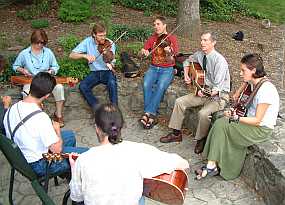 In my previous post on this topic of being spiritually attractive, I noted that, too often, the contemporary Church in America resembles the slightly annoying, loud, “two bagger” friend of the naturally beautiful girl, and that’s the reverse of what it should be.
In my previous post on this topic of being spiritually attractive, I noted that, too often, the contemporary Church in America resembles the slightly annoying, loud, “two bagger” friend of the naturally beautiful girl, and that’s the reverse of what it should be.
We are the Bride of Christ, not the also-ran. We caught the bouquet at the wedding long ago and we’re the ones getting married. We’re the ones at the altar. It’s our day. There is no time today for being the hopeful, though-probably-doomed-to-spinsterhood bridesmaid.
Everyone noticed the early Church. Thousands rushed into the Kingdom. In the first 300 years of existence, the Church grew from a handful of souls to what historians peg at 20-25 million. The world noticed the Church’s beauty.
But there’s a world of difference between “Wow! Check her out!” and “Eww, check her out!” Too often , the American Church resembles the latter. We’re attractional in the wrong way. There’s a big difference between catching a second look because we’re a stunning beauty and catching the look because our ample gut is spilling over our low-rider jeans.
Here’s how the Church can be beautiful to the lost people of the world:
1. Listen more; talk less.
Dale Carnegie, of How to Win Friends and Influence People fame, long ago noticed that we human beings enjoy people who are willing to listen to us. Studies have borne out this truth. When all other influences are factored out, we find that the person who listens is deemed the more attractive person.
The meteoric rise of social networking sites on the Web and microblogging tools like Twitter have captured the public fancy because, deep down inside, people are dying for someone, anyone, to notice them. Our society is an increasingly detached and cold one. We’ve spurned the types of communities that for all of human history provided a sense of connection and inclusion.
Listening is the ultimate reconnection, the big notice.
Christians need to reconsider how we apportion our listening and our speaking. Ten theologically astute sermons may, in fact, not balance out one serious listening session on our part when we offer a damaged person our ear (free of advice). We may listen for ten hours, but at the end of that ten, our simple statement, “I hear you. And Jesus is the answer,” may be the extent of the sermon we have to give to help usher someone into the Kingdom of God.
Some people have never had anyone hear their story. As a Christian, what more attractional gift can we offer than to be the one willing to listen.
2. Be the other person.
Paul said it best:
To the Jews I became as a Jew, in order to win Jews. To those under the law I became as one under the law (though not being myself under the law) that I might win those under the law. To those outside the law I became as one outside the law (not being outside the law of God but under the law of Christ) that I might win those outside the law. To the weak I became weak, that I might win the weak. I have become all things to all people, that by all means I might save some. I do it all for the sake of the gospel, that I may share with them in its blessings.
—1 Corinthians 9:20-23
Our failure to live this way may be the most profound reason why unbelievers don’t want to have much to do with us. Not only does a lack of empathy on our part separate us from other people, but so does our holier-than-thou attitude that we often lord over those who are not like us.
Too harsh?
Consider that Paul became weak to win the weak. He didn’t lounge in his position of strength and say to others, “See how strong I am, while you are weak. Don’t you want to be like me?” In other words, he didn’t act like a pitchman on some self-help infomercial—as we all know, those guys are just universally loved by all, aren’t they? Envy makes a lousy entryway into the Kingdom.
Or imagine the reception Paul would have received at Mars Hill should he have stepped to the dais and said, “Listen up, you godless philosophers, repent or die in your sins.” Instead, he took the time to consider the discussion of the philosophers and their ideas and used their same ideas and language to point to Christ.
When we talk to others about Christ, do we do so as one of them, yet filled with the Spirit of God?
3. Never let our own cherished opinions serve as an impediment to others.
The Enemy of our souls is far more cunning than we give him credit for. Our own nonessential belief systems are one of his greatest tools to make the Church ugly.
I’m old enough to remember the first run of All in the Family. I remember the stir that Norman Lear caused by making Archie Bunker the mouthpiece for contemporary America. We laughed at Archie’s bigoted opinions about Jews, blacks, “homos,” and “commie pinkos.” But we did so nervously.
Archie painted himself as a Christian, though he was more of a believer in the American civil religion than anything. Still, which of us would want him to join us on a door-to-door evangelistic outreach? Anyone?
Yet too often, each of us is not too far removed from Archie. Our opinions may not be as comically outrageous to us, but to others they might be.
Last night, I listened to a group of representative Evangelical believers talk. Here are some excerpts of that discussion:
“Ann Coulter said….”
“I heard that you can tell the quality of a history book by how it portrays Ronald Reagan.”
“The public schools are indoctrinating children. That’s why we must homeschool.”
“Angry homosexuals picketed Rick Warren’s church….”
In the end, not a single one of those statements advances the Gospel. In fact, each may serve as an impediment to someone else coming to the Lord. They are political statements, statements about lightning rod individuals or culture war issues, but not a single one points to Jesus. Instead, they serve as roadblocks to the Kingdom of God for people who don’t like Ann Coulter, had a career in air traffic control derailed, send their kids to public school, or who happen to be an angry homosexual because they were homosexually molested for years by an uncle and only now realize how messed up their lives are because of it.
When I read the New Testament, I don’t see Jesus or the early Church dropping political or social roadblocks in the way of dying people who are longing for the Good News. Neither should we. I’m sure folks back then had some cherished opinions about those “scumbag Samaritans,” but didn’t Jesus defuse those?
We tend to forget that “and such were some of you.” We don’t remember where we came from. We accumulate our cherished opinions over time and think that everyone must think just as we do or else they are scumbag Samaritans. Our opinions and rhetoric can make us ugly.
Only the Gospel is important. Everything else is filler—and often misguided filler at that. It’s time we spent less energy reinforcing our beliefs on filler and spend more time allowing Jesus center stage by reflecting His heart on what really matters, the salvation of the lost and their discipleship in the core essentials of the Faith.
4. Live the truth rather than deliver well-intentioned speeches about it.
Talk has never been cheaper. As I have said many times here at Cerulean Sanctum, the entire Western world has heard the name of Jesus from the mouths of Christians. Now it is simply waiting to see if this talk of Jesus is true by the way His followers live out their rhetoric.
We Americans love people of action. The person who built rescue shelters for battered women gets our attention. The person who only talks about doing so does not.
Every Sunday, Christians attend some 300,000+ recognized Christian churches in America. they hear 300,000+ sermons. Yet only a handful of those attendees go out and put what they hear into practice.
What does it mean to love your neighbors, perhaps those people who lives next door, when neither you nor I have once served them or even taken the opportunity to know their names?
The one thing that may speak louder than a million sermons to the lesbian who lives next door may be that you show up at her doorstep with food and a listening ear when her partner is killed in a car wreck.
All the rhetoric in the world can be undone by one simple act of love and mercy. A million roadblocks to heaven can be blasted away by an act of kindness in the name of Jesus.
You may be the only one who sends a birthday card to the drug-dealing kid in your neighborhood.
You may be the only one who shows up at the book signing when the communist at work finally gets his manifesto published.
You may be the only representative of Jesus Christ who ever manages to surrender a few minutes out of a busy life to care enough to be there for someone else in their time of need.
A couple weeks ago, I wrote about one of the least-known of Jesus’ parables. That story tells of two brothers, one who talked a good one but did nothing and one who actually lived out the good. One of those brothers was attractive. The other was reduced to telling himself that he was when he wasn’t. The difference was in what each brother did.
Which brother are we going to be?
5. Nurture beauty at home.
Hinduism is not beautiful and never will be. Why? Because the Hindus will never be one. Some are in and some are out. They hold up some of their own for acclaim while despising the lowest of their members.
Hinduism isn’t the only religion that draws distinctions among its own. Most religions do.
Genuine Christianity does not. The weakest of our own are to be given the most protection and love. When the Romans tossed their sick and elderly onto the burn piles to die, the Christians swooped in and made them their own. Most historians will note this is one reason why the Church grew fantastically in Rome. The believers loved the weak, even when those weak were their own brothers and sisters in Christ.
The world is watching how we treat our own, the people we say are our brothers and sisters in Christ. In an age of advertising, the worldly can spot lies and hypocrisy a mile away. Must we add to their cynicism by saying we love everyone yet we can’t abide our own?
How we live out the Gospel within the household of Faith will determine the beauty of the face we show the rest of the world. If we walk out of our assemblies grumbling about Sister Sandra, unbelievers will see and make a mental note, a note that may very well bar them from heaven when all is said and done.
Imagine being a widow in Palestine circa 50 AD. No means of support. No one to love and care for you. Little hope for life. Then you hear about the Christians. Then you see how the Christians treat their own widows and those outsider widows who become a part of their fellowship. Wouldn’t that be attractive to you? Wouldn’t you want to know what it is about these people that they love the unloved? They give honor to those who are rejected by the rest of society. There must be something different about them. Wouldn’t you want to know what accounts for that difference?
If we put on Christ at home in our assemblies and walk out into a waiting world, our natural beauty will shine through, and the people who are desperate will want what we have. If people are not clamoring to have a part of what we have, then perhaps we need a gut check on how we appear to a dying world.
6. Foster beauty in all its expressions.
The Christian is the arbiter of beauty. When we consider the greatest works of beauty in this world, many, if not most, where crafted by Christians. The finest symphonies, the most glorious paintings, soul-stirring literature—Christians who reflect the creative beauty of their Lord made those things.
Yet something happened to the Church about a hundred years ago. We forgot what it meant to cultivate beauty. Instead, our creative works became derivative, weak imitations of worldly “masterpieces” that were lacking in all taste and talent. Today, what passes for beautiful art, music, and literature in the Church all too often exemplifies the worst excesses of consumerism, modernism, and lowest common denominator thinking. It is attractive only to those who have no concept of genuine beauty.
So when the world isn’t all that thrilled by our artists, musicians, and authors, should we be surprised? In fact, we should be ashamed that we continue to tolerate kitsch in the name of Christ.
Christian MUST recapture the arts. And to do so, we must recapture the most talented artists. Fact is, because artists of all kinds ARE a different sort of person, we Christians need to realign our thinking on the arts and the artists who make them. God loves skilled artisans. We Christians should, too. They are the ones who help us understand beauty. If we continue to drive them away, then we will be driving beauty away with them, and ultimately all those lost people who are looking for the Church to define beauty and ugliness.
If we do not know what is beautiful, how can we show beauty to the world?
7. Because some aspects of beauty are solely cultural constructs, embrace a broader definition of what is attractive.
Peter Paul Rubens. You know, the guy who painted all those zaftig Renaissance dames. Well, they were real lookers, those plus-sized models, at least in Rubens’ day (though not so much our own). Tough to see what Rubens and his peers saw in those BBWs.
Each of us in the Church is blind in one spot or another to what is genuinely beautiful. Much of the Earth is populated by creatures that seem to defy beauty, yet God called each one He created good. I know I don’t exactly find opossums to be the supermodels of the animal kingdom, but God differs.
What are we calling ugly in the midst of the Body of Christ that is, in reality, beautiful from God’s perspective? This is important to note, because if we are to be attractive to the lost, we must reflect beauty in all its forms, even those forms that are alien to us.
I’ve known churches where the theologian is reviled while the social worker is deemed lovely. I’ve known churches where the financially successful are exalted while those who do good, yet have little in the bank, are held in contempt. For too long we have clung to what we believe is beautiful and rejected beauty in other guises.
If we are to be attractive to the world, we need an overhaul of our limits on beauty. We need to ask the Lord what is beautiful and not trust our definitions alone. If we can call the cross a symbol of beauty despite the scandal and ugliness of what happened upon it, then we can learn to find beauty in places we never looked before.
And when we do, we will attract even more of the lost.
In the end, the Church is called to be lovely, winsome, and charming. This does not mean that we surrender the cross, though. Not everyone who will be attracted to our beauty will persist through the death of self at the cross. But the cross alone should be the impediment and nothing else. And that cross doesn’t need us to add to its nature.
Our job is to be beautiful because we reflect Jesus, and He is beautiful above all.
I’ve laid out seven ideals on attractiveness. Many more exist. What is your input? Or should I say, “What are your beauty tips?”

 Such a move makes us less dependent on consuming and more dependent on each other. Not only this, but we encourage others to use their gifts. We provide an example to the young and to each other. The musical talents we share uplift the community that forms around our music.
Such a move makes us less dependent on consuming and more dependent on each other. Not only this, but we encourage others to use their gifts. We provide an example to the young and to each other. The musical talents we share uplift the community that forms around our music. Because nothing beats a spectacle when attempting to prove one’s royal lineage.
Because nothing beats a spectacle when attempting to prove one’s royal lineage.